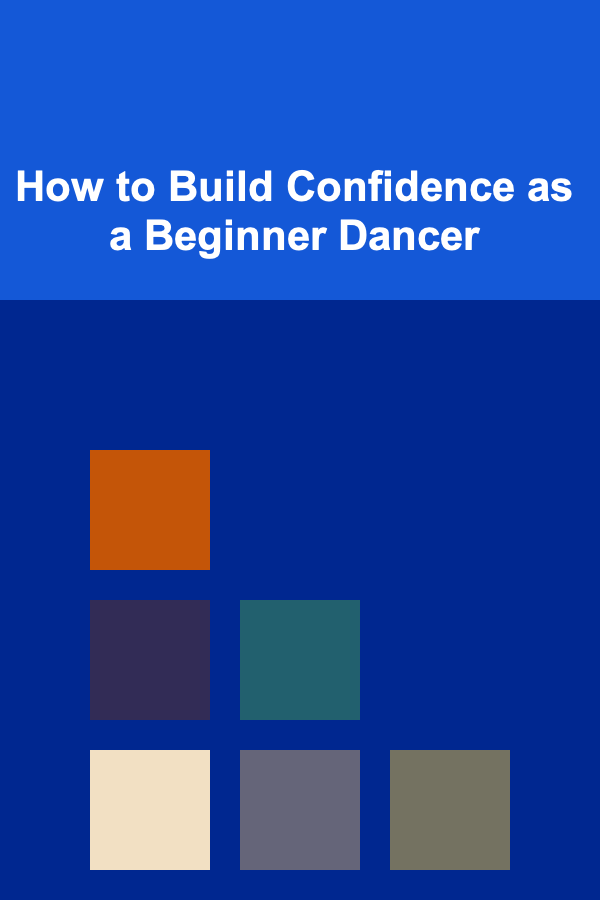
How to Build Confidence as a Beginner Dancer
ebook include PDF & Audio bundle (Micro Guide)
$12.99$7.99
Limited Time Offer! Order within the next:

Dancing is an expressive art form that blends creativity, physicality, and emotion. For beginners, it's often a journey of self-discovery, discipline, and, importantly, building confidence. Whether you are learning ballet, hip-hop, salsa, contemporary, or any other style of dance, the path to feeling confident on the dance floor can be challenging, especially when you're just starting. But don't worry -- everyone has to start somewhere, and with the right mindset and strategies, you can build the confidence needed to dance freely and expressively.
Building confidence as a beginner dancer is not about perfection; it's about embracing the learning process, being patient with yourself, and taking the time to understand your body and its capabilities. Confidence comes from consistent practice, positive self-talk, and, most importantly, creating an environment where you feel safe to explore and take risks.
This article will explore practical steps, strategies, and tips to help you build confidence as a beginner dancer.
Understanding the Importance of Confidence in Dance
Before diving into specific strategies for building confidence, it's important to understand why confidence is so crucial in dance. Confidence allows you to:
- Express Yourself: Dance is a form of personal expression. The more confident you are, the more freely you can communicate through movement.
- Take Risks: Confidence enables you to step out of your comfort zone, try new movements, and push your boundaries.
- Overcome Self-Doubt: Dance can be intimidating, especially when you're learning something new. Confidence helps you shut down the negative voice in your head and overcome feelings of inadequacy.
- Improve Performance: With confidence comes a more relaxed and fluid performance. You will feel less self-conscious and be able to focus on technique, timing, and rhythm.
Confidence is the foundation for becoming a great dancer, so it's worth investing time and energy into cultivating it.
Step 1: Embrace the Learning Process
One of the biggest obstacles to building confidence as a beginner dancer is the expectation of perfection. Many beginners feel discouraged if they can't master steps quickly or if they make mistakes in class. However, it's important to remember that learning to dance is a process, and mistakes are a natural part of that process.
Shift Your Mindset
Instead of focusing on flaws, reframe your mindset to embrace progress. Celebrate small achievements, whether it's mastering a basic step, improving your balance, or dancing without hesitation. Acknowledge that no one is perfect, and every dancer---no matter how experienced---has to go through a learning phase.
Set Realistic Expectations
Don't expect to be flawless from the start. Dance is complex, and it takes time to develop strength, flexibility, rhythm, and coordination. Set realistic goals and focus on gradual improvement rather than perfection.
Step 2: Consistent Practice is Key
Confidence comes with familiarity and practice. The more time you spend dancing and becoming familiar with the movements, the more comfortable and confident you will feel.
Establish a Routine
Dedicate time each week to practice your dancing. Consistency is crucial, as it will help your body become more familiar with the movements and improve your muscle memory. Regular practice will also help you build strength and stamina, which will improve your overall performance.
Focus on Technique
When you're practicing, don't just focus on speed or memorization. Pay attention to the details of each movement. Focus on proper posture, alignment, and technique. The more you focus on mastering the technical aspects, the more confident you will become in your ability to execute movements correctly.
Record Your Progress
Sometimes, it's difficult to see our own improvement. Recording yourself while practicing allows you to track your progress over time. It will help you notice changes and areas that need more attention. Watching videos of yourself also allows you to identify the areas where you feel more confident and where you may need to put in more effort.
Step 3: Develop a Positive Self-Talk Practice
Negative self-talk is one of the biggest confidence killers, especially for dancers. Thoughts like "I'm not good enough" or "I'll never get this step right" can undermine your confidence and prevent you from progressing. It's essential to replace these negative thoughts with positive affirmations and constructive self-talk.
Identify Negative Thoughts
The first step in combating negative self-talk is becoming aware of it. Whenever you notice yourself doubting your abilities or feeling discouraged, pause and identify the thought. Is it a realistic assessment of your abilities, or is it a product of insecurity?
Challenge Negative Thoughts
Once you identify negative thoughts, challenge them with positive ones. If you think, "I can't do this step," replace it with, "I may not be able to do it yet, but I'm working on it, and I'll improve with practice." Be kind to yourself and acknowledge that learning takes time.
Use Positive Affirmations
Start each practice session or class with positive affirmations. Tell yourself things like, "I am a dancer, and I'm improving every day," or "I am confident and capable of learning new things." These affirmations can help rewire your brain to see yourself as a confident and capable dancer.
Step 4: Find a Supportive Community
Building confidence as a dancer is much easier when you are part of a supportive community. Being surrounded by people who encourage you and celebrate your progress can have a huge impact on your self-esteem.
Join Dance Classes or Groups
Enroll in beginner dance classes where the atmosphere is encouraging and open to learning. Finding a class with students at your level will help you feel more comfortable and reduce any feelings of competition or comparison.
Connect with Fellow Dancers
Take time to get to know your classmates and other dancers. Building relationships with others who are on a similar journey can help you feel more comfortable and less isolated. Share your struggles and celebrate each other's progress. Feeling supported by your peers can go a long way in boosting your confidence.
Seek Constructive Feedback
Constructive feedback is valuable for growth. Don't be afraid to ask your teacher for feedback on your movements, technique, or performance. When receiving feedback, remember to approach it with an open mind and see it as a tool for improvement rather than a criticism of your abilities.
Step 5: Practice Mindfulness and Body Awareness
Dance requires full-body awareness and coordination. Sometimes, confidence issues arise when we are not fully present in our bodies or are overly self-conscious about how we appear to others. Mindfulness practices can help you become more attuned to your body and improve your confidence on the dance floor.
Breathing Exercises
Take deep breaths before and during your practice. Focusing on your breath can help you relax and clear your mind. Controlled breathing also helps you stay focused and calm, making it easier to execute movements with confidence.
Body Awareness
Dance requires a strong connection between mind and body. Pay attention to how your body feels during each movement. Are you tense or relaxed? Are you aligned properly? Body awareness will help you move more confidently and gracefully.
Visualization Techniques
Visualization can be a powerful tool for building confidence. Before dancing, close your eyes and visualize yourself performing the movements with ease and confidence. Imagine how it feels to execute each step perfectly. This mental rehearsal will help increase your self-assurance when it's time to dance.
Step 6: Celebrate Your Progress
Building confidence is a gradual process, and it's important to celebrate every step forward. Even if you don't feel like a perfect dancer yet, acknowledging your progress will help you stay motivated and boost your confidence.
Track Milestones
Keep track of milestones, such as learning a new dance step, improving your flexibility, or feeling more comfortable in front of a mirror. Celebrate these achievements, no matter how small they may seem. Every victory is a step toward greater confidence.
Dance for the Joy of It
Remember why you started dancing in the first place: the joy of movement and expression. Don't focus solely on achieving perfection or impressing others. Dance for yourself, and the confidence will follow naturally.
Step 7: Challenge Yourself and Step Out of Your Comfort Zone
Finally, it's important to step outside your comfort zone if you want to grow and build confidence. Challenging yourself will allow you to see what you're truly capable of and will push you toward new levels of self-assurance.
Try New Styles or Techniques
As a beginner dancer, you may feel comfortable sticking to one dance style. However, trying different dance styles or techniques can expand your skills and improve your overall dancing. It will also show you that you're capable of adapting and growing as a dancer.
Perform in Front of Others
While it may seem intimidating at first, performing in front of others is one of the fastest ways to build confidence. Start small by dancing in front of friends or family, then gradually work up to performing in classes or at events. Each performance will help you feel more confident and comfortable in your own skin.
Conclusion
Building confidence as a beginner dancer is a journey, not a destination. It requires patience, persistence, and a positive mindset. Embrace the learning process, practice consistently, replace negative self-talk with affirmations, surround yourself with a supportive community, and challenge yourself to grow. By following these steps, you can transform your insecurities into strengths and develop the confidence needed to dance freely and expressively.
Remember, the most important thing is to enjoy the journey and trust that with time and dedication, you will continue to evolve as a dancer and as a confident individual.
Reading More From Our Other Websites
- [Hiking with Kids Tip 101] Family-Friendly Desert Routes: Where to Go, What to See, and How to Prepare
- [Home Storage Solution 101] How to Optimize Home Storage Solutions for Clothes
- [Personal Finance Management 101] How to Use the Debt Avalanche Method When You Have Irregular Income
- [Organization Tip 101] How to Develop a Routine for Virtual Workspace Maintenance
- [Skydiving Tip 101] From Takeoff to Landing: A Step‑by‑Step Guide to Editing a Skydiving Video
- [Organization Tip 101] How to Optimize Your Cloud Storage for Cost Efficiency
- [Home Space Saving 101] How to Unlock Vertical Space with DIY Pegboard Organization Ideas for Garages and Workshops
- [Home Staging 101] How to Enhance Curb Appeal for a Winning First Impression
- [Home Security 101] How to Improve Home Security for Renters: Tips and Solutions
- [Organization Tip 101] How to Foster Collaboration in Shared Volunteer Spaces

How to Build Wealth Through Real Estate Investment
Read More
Understanding Job Descriptions: Decoding Employer Needs
Read More
Smart Shopping: A Step-by-Step Saving Strategy
Read More
How to Prepare for Behavioral Interview Questions: A Detailed To-Do List
Read More
How to Understand Genetic Predisposition to Disease
Read More
How to Create Immersive VR Experiences with Unity
Read MoreOther Products

How to Build Wealth Through Real Estate Investment
Read More
Understanding Job Descriptions: Decoding Employer Needs
Read More
Smart Shopping: A Step-by-Step Saving Strategy
Read More
How to Prepare for Behavioral Interview Questions: A Detailed To-Do List
Read More
How to Understand Genetic Predisposition to Disease
Read More